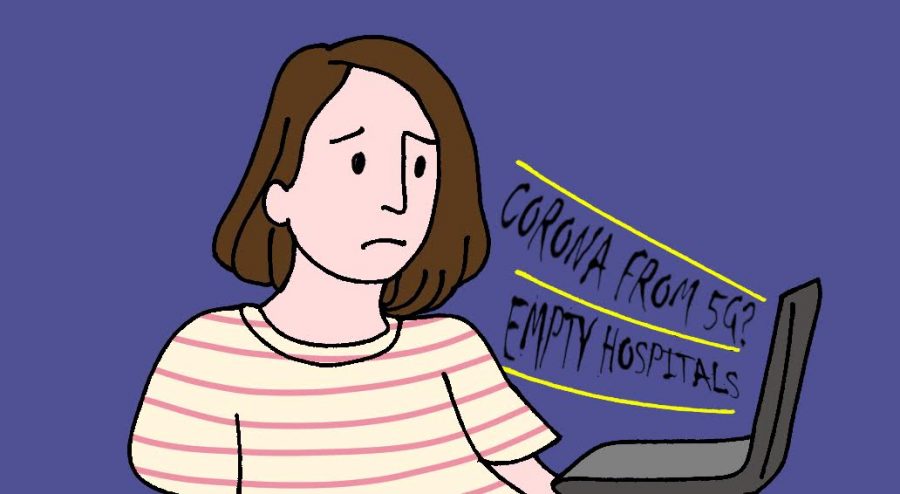Misinformation and fake news: coronavirus creates a whole different level
April 24, 2020
Cooped up at home, the internet is usually a frequent and easy respite from the events unfolding in the world around us. However, the media that we turn to for that relief during normal times increasingly mongers fear and perpetuates misinformation.
I read and respond to all sorts of comment sections, even against my better judgment: of my Republican congressman and my Democratic governor, to name a few. I do this for two reasons; firstly, it forces me to synthesize my ideas into something coherent, and affords me the opportunity to make the “other side” seem less outrageous to certain commenters. Secondly — and, in my judgement, most importantly — it helps me read the pulse of what people see on the internet, twice removed from reality. This means seeing news through others’ eyes.
News is something that is patently unavoidable in an information-driven pandemic, where we patiently focus on the ever-rising numbers of confirmed cases and deaths. After this inundation, each individual, from the myriad choices they have in terms of source and depth, comes to conclusions about the state of affairs. The perception in their mind is a sort of granular map of the world: not quite accurate, but a depiction based on the information — often tailored and biased — that they have received.
What I see from individuals’ mental maps can be disturbing: more people than I ever thought possible are being increasingly pulled into the depths of harmful conspiracy theories. These include, but are not limited to: malicious suppression of treatments by governmental officials, threats of martial law and depravity of basic human rights, purposeful manipulation of the stock market, allegations that hospitals are actually empty and that 5G radio technology causes disease, among others.
“Ideas” like these, combined with disparaging mindsets of “I’ll do what I want” and “herd immunity” only serve to increase the number of our sick and dying.
And part of this is due to the “algorithms” that drive people deeper into extremist content. In a lecture to the Royal Institution, educator Tom Scott notes, “it seems as if you are never ‘hardcore’ enough for YouTube’s algorithm.” Similarly, TikTok has repeatedly been under fire for being a breeding ground for political content, with absolutely no way to check the factuality of claims made. All this, while using human moderators to suppress content from users who fit the categories of “chubby… obese” or “[u]gly facial looks”. Facebook and Twitter need no introduction about misinformation – their reputation precedes them.
And that’s it. Platforms increasingly have become home for political content and serve to push people deeper into rabbit holes with almost no facts behind them. They have no incentive not to do this, aside from the occasional media-driven backlash. It increases view time, and, therefore, more ads can be served and sold alongside that malicious information.
I am not going to speak behind the governance and regulation of this — controlling trillion-dollar companies on an international scale is a monumental challenge. After watching clips of congresspeople interview Google’s CEO while demonstrating a pathetic grasp on how tech works, it is clear that our elected officials, too, are not currently equipped to address this problem.
We, as college students understanding the importance of respectful and meaningful conversations, must do our individual parts to ensure that dialogue around this pandemic, which often and unfortunately bleeds into political speech, is one that draws from facts. Address these discussions with kindness because, in my experience, starting with “You’re wrong, and here’s why” will not work to change minds. Be mindful that nearly everyone wants the same thing: for society to return to normal as quickly and safely possible, and to never have to worry about this pandemic again.
In a time period where press pools turn into ad time, nightly broadcasts are continuous loops of our nation’s inadequacies, and social media serves to drive wedges into our nation, we must do our part to work with our friends and neighbors to get through this pandemic – together.





















